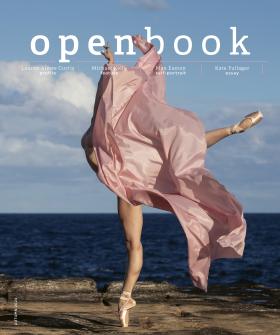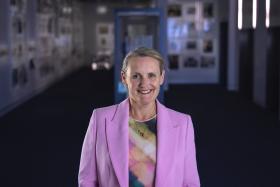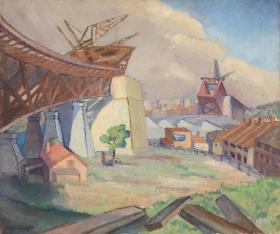There is a waiting in the historical novel Edenglassie that feels familiar to me. I think it is a catch in the breath, a tension, a knowing of what is to come with an inability to intervene. Goorie writer Melissa Lucashenko’s latest novel opens in the nineteenth century, when Yagara people are hoping that the English, who call themselves masters, will soon leave. We follow Mulanyin, a young visitor from Nerang, near the present-day Gold Coast, and his found connections with the Yagara people living in Brisbane, which was once named Edenglassie.
This past pulls at a present when, in 2024, Aunty Eddie takes a fall in Brisbane which acts as a catalyst for truth, for her family and loved ones. Lucashenko writes, ‘The rising pillars of smoke joined the Sky Camps to the earth, knitting the past and the present together in one tremendous tableau.’
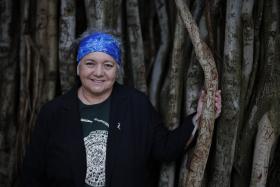
I plan a phone call with Aunty Melissa Lucashenko because we live hours and hours from each other, something that proves slightly difficult as we work around multiple time zones. But we reach each other one Sunday morning and make quick work of discussing her history of storytelling, Blackfella things and her renowned novels.
Lucashenko is the youngest of seven children and the only girl. When I ask her about storytelling and its part in her early life, she answers immediately that a library, and her mother, played a huge role. ‘My Mum took us to the library religiously because she didn’t have money for clothes growing up, let alone for books … The idea of being an author was a bit like saying you want to be an astronaut.’
Despite feeling the improbability of a career as a writer, Aunty Melissa was creating poetry from her teenage years and throughout university. She began a degree in business, however, with a mind to work in an industry that would actually pay the bills. This is a path similar to my own, and so I ask her how she wound up publishing her work. ‘It was the encouragement of an American academic, actually,’ she says. ‘Elaine McCoy. She's a bit of a citizen of the world. She’s back in the States now, but she mentored me … so I probably blossomed under her.’
We agree that sometimes all it takes is one person.
Aunty Melissa’s first published novel was based on a short story she wrote in 1990 while living in Darwin. The story centred around Eagleby, in the City of Logan on the outskirts of Brisbane, and a relationship she’d left, along with the place itself. It was a time in her life that she turned to writing to process it all. This short work eventually became her debut novel, Steam Pigs. ‘By the time it was published in 1997, I was living in Tonga and knocked off my second book, a young adult book called Killing Darcy, and half of my third book, Hard Yards.’
‘I wanted to write a better book, I suppose. A different kind of book.’
I’m a writer myself, so I selfishly ask her what her writing routine is. If she has any trade secrets on creating award-winning work, she doesn’t let on. But, like most other writers she knows, she writes in the morning and reckons she’s been accidentally keeping school hours. For Edenglassie, Aunty Melissa read and researched throughout what she calls a ‘four year slog’. The Bone People, the Booker Prize–winning novel by Keri Hulme, was one of her major influences, as well as Demon Copperhead by Barbara Kingsolver. She says of this novel, which won the 2023 Pulitzer Prize for Fiction and the Women’s Prize as well, ‘I thought it was absolutely fantastic. And something to aim for or emulate.’
Edenglassie depicts the story of Mulanyin, a talented and captivating young Yugambeh man trying to realise his hopes and care for loved ones and Country during the early years of colonisation. It also tells of a time long after Mulanyin, through the striking character Aunty Eddie in Brisbane and her granddaughter Winona as they navigate love, health, politics and the statues of colonisers and others that watch over their home.
The novel opens with Auntie Eddie’s fall in South Bank and follows her recovery in hospital. Her voice jumps off the page. ‘She was fun to write,’ Aunty Melissa tells me. ‘And possibly she is an amalgamation of the Aunties I’ve helped write their memoirs with, and my Mum too … That kind of language of the 1920s and 1930s was a real joy to excavate for me.’
Too Much Lip, published in 2020, was Aunty Melissa’s Miles Franklin–winning novel. Its protagonist, Kerry, returns home to Bundjalung Country as her Pop is dying. Her time there is full of family secrets, new romance and her family’s mission to protect a river condemned for development. Kerry, a middle-aged Aboriginal woman, was a character Aunty Melissa felt comfortable writing. She says that writing Edenglassie, where the protagonists are a young man living in the nineteenth century and a First Nations Elder from the twenty-first century was a challenge. So, she listened to her nephews and thought deeply about what it was they cared for in life. She reflected on the dialogue of people she’d known once — the way others talk is fascinating to her. Indeed, the writing and dialogue in Edenglassie feels physical, as if it were woven and composed of multiple layers for the multiple readers who will pick it up.
If you’re wondering whether Aunty Melissa felt daunted about beginning another novel after the success of Too Much Lip, the answer is yes. ‘I wanted to write a better book, I suppose. A different kind of book.’ The background work and plotting Aunty Melissa had to do to write Edenglassie ended up being a distraction from the long shadow cast by Too Much Lip. ‘The amount of work in this book was just phenomenal.
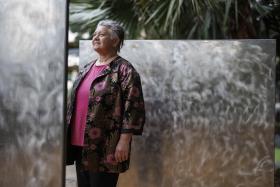
The research with trying to get the voices right. You know, writing a young man not long after colonisation was very tricky.’
Edenglassie also dips its pages lightly into the topic of identity and what it means to be a First Nations person and be accepted by communities as a First Nations person. I ask Aunty Melissa what type of conversations she was having about this as she wrote. She says, ‘Alexis Wright once just gave me very brief but pithy advice. She just said to me: Never buy into identity shit. And I’ve always remembered that and kept that as a kind of motto. So, I don’t really talk about it a great deal, but I do a lot of observing.’
These moments of conversations about identity within Edenglassie came from Aunty Melissa’s aim to, as she says, ‘demonstrate what I thought approaching that dilemma with First Nations values looked like. Which is a range of things, you know, it can be well known as incandescent rage. Or it can be Granny Eddie saying, “No, you’re thinking like a white man and we bring people in,” which she does in response to Winona’s scepticism about Johnny newly identifying as Indigenous.
Country is central to the hearts and stories of the Black characters in Edenglassie. Country is an undulating, sometimes quiet and sometimes loud character. Mulanyin says:
‘But in my Country the burragurra crashes onto the sand one hundred times louder; the waves are this high,’ he demonstrated with a hand at his neck, ‘before they curl over and kiss the beach with passion, as though they really mean it. The poundingof the surf is the sound of my heart; that and the kurrumburum singing up the dawn.’
The lands and seas are painted to life by Aunty Melissa’s words and moved images of my own homelands across my mind. The settings are full of depth, history and truth. Only Country leads the characters through life: Aunty Eddie’s doctor, young Johnny’s care for a small creek, Winona’s suggestion to burn down Parliament House as she steps through the iconic West End’s Boundary Street. When Mulanyin despairs over tragedy unfolding in his faraway home, he longs for Nerang but questions where he truly belongs. His is a familiar longing for Country, and for people, a sentiment common among First Nations peoples since invasion. There is a discomfort that Mulanyin feels in connections that draw him further from his home. It makes me think of the occasional panic I feel for my own future children. What will they learn of their many cultures when living off Country?
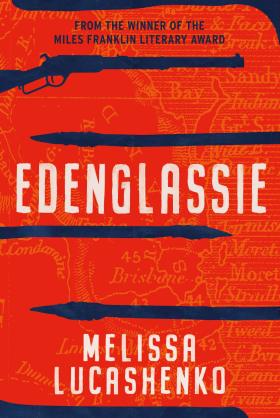
Buy from Library Shop
It is a deeply generational novel; the impacts of characters’ actions reach across time. The generations have different perspectives, in the book as it is in life. I marvelled as I read a line like this one, for example, at how Aunty Melissa wrote about generational differences when crafting story: ‘Granny Eddie sighed. These young generations had such freedom … But oh! So much angrier than her generation had ever been.’
Violence of many kinds stands at the forefront of Edenglassie. From public executions, language thrown with acidic tongues, hurt and harm hanging over characters in the past and into the present. It is pain that is circular and inexplicable. It reaches from the page and grips my heart. This can be hard to read, and I ask Aunty about her experience writing about this. She answers, ‘I suppose because I was in control of what happened to them in the narrative, it might have been easier for me than for a reader … So that’s one of the reasons I split it between the modern and the historic era.’
Aunty Melissa is also deft in the way she reveals extreme hurt and which characters she allows to tell truth within the novel. Even though it can be difficult to consume at times, I felt taken care of. Her use of humour also plays a leading role within Edenglassie, as with her previous novels. It comforts and connects me to the characters.
Edenglassie asks questions about how so-called Australia can be as it is now. What sort of life can we have, what sort of world can we be in where this history is real, yet largely unknown? Towards the end of the novel, Mulanyin cries to a loved one, ‘What has this life become?’ His story traces horror and death in places where I’ve lived and breathed. In the notes that I scribbled while reading I wrote, ‘How can we step on this land without constantly thinking of past and present atrocities?’
When I ask Aunty Melissa what she wants her readers to know after reading her work, she is quick with her answer, ‘That they live on Aboriginal land,’ she says. ‘And that the history is with us every second of every day.’
Jasmin McGaughey is a Torres Strait Islander and African American writer and editor.
Buy Edenglassie from the Library Shop
This story appears in Openbook summer 2023.

